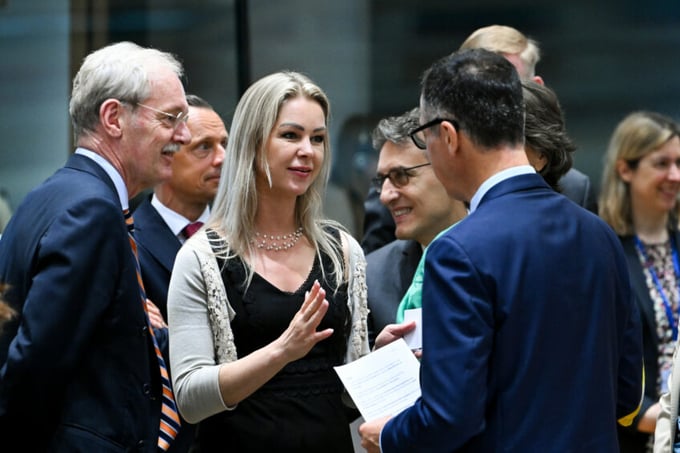May 29, 2025 | 18:18 GMT +7
May 29, 2025 | 18:18 GMT +7
Hotline: 0913.378.918
May 29, 2025 | 18:18 GMT +7
Hotline: 0913.378.918

Femke Wiersma (second, left), the new minister of agriculture, claims not to have a choice in introducing the policies. Photo: Boerderij.
Last November, general elections resulted in a substantially more right-wing government, which had sparked the hope in the Dutch agricultural sector for more favourable policies. Especially the fact that also the Farmer-Citizen Movement (BBB) is now part of the government coalition was thought to be reason for optimism. One reason why the BBB managed to attract strong support was because the previous’ government’s ambition to reduce the number of livestock, having severe consequences for the countryside.
The new coalition, however, is adamant that the number of animals needs to come down – with one difference, that it has chosen a slightly less drastic approach. The new policy aims to reduce livestock numbers by reducing the permit quantity on farms. Every time a farm will change ownership outside the family, a new permit will be for 70% of the original cattle capacity, 75% of the original pig capacity and 85% of the original poultry capacity. In addition, new buying-out regulations will be introduced.
The reason behind the policy is related to European legalisation around manure and water quality. Femke Wiersma, the new minister of agriculture, claims not to have a choice in introducing the policies. In an interview with sister title Boerderij, she said, “I would have preferred not to do this, but there are agreements with Brussels I have to comply with.”
With regard to manure,the Netherlands have been able to perform for years using an exception to apply more manure to the lands than its neighbouring countries. The exception was known as the “derogation,” which the Netherlands obtained in 2006. The country convinced Brussels that its many meadows can deal with the nitrates very quickly. That is why for all those years, Dutch farmers have been allowed to apply 230-250 kg nitrogen/ha on their lands instead of the 170 kg/ha which is part of the European nitrate directive. Main goal of this directive is to protect fresh water quality.
As from January 1, 2026, however, this exception is no longer permitted by Brussels. That is why the Netherlands have to find a way to reduce the amount of manure it produces.
Wiersma does have the ambition to go and talk to Brussels to see whether a new derogation can be achieved. She does add, however, “With our ambition to go and make new agreements with Brussels, it wouldn’t help now not to meet our targets. That could lead to an immediate withdrawal of the current derogation, making things considerably worse, even.”
Minister Wiersma does meet the country’s farmers by reducing the area of “derogation free zones,” these were strips of farmland close to natural areas. In the original plans those were 250 m wide, they will be reduced to 100 m wide. In practice this means that farmers will have more land on which manure can be used.
It remains to be seen whether or not the new plans will satisfy “Brussels.” Even though the previous’ government’s plans were felt to be too drastic by the Netherlands’ agricultural industry, the country’s Council of State however said even those weren’t sufficient. It remains to be seen what the council will have to say about the new plans.
The plan to reduce the country’s pig, poultry and cattle populations are a different programme than the relaxation of the nitrogen rules, which were announced last week. The abolishment of those plans, felt to be too stringent by many, were welcomed in the world of agriculture.
(PP)

(VAN) Vikas Rambal has quietly built a $5 billion business empire in manufacturing, property and solar, and catapulted onto the Rich List.

(VAN) Available cropland now at less than five percent, according to latest geospatial assessment from FAO and UNOSAT.

(VAN) Alt Carbon has raised $12 million in a seed round as it plans to scale its carbon dioxide removal work in the South Asian nation.

(VAN) Attempts to bring down the price of the Japanese staple have had little effect amid a cost-of-living crisis.

(VAN) Fourth most important food crop in peril as Latin America and Caribbean suffer from slow-onset climate disaster.

(VAN) Shifting market dynamics and the noise around new legislation has propelled Trouw Nutrition’s research around early life nutrition in poultry. Today, it continues to be a key area of research.

(VAN) India is concerned about its food security and the livelihoods of its farmers if more US food imports are allowed.